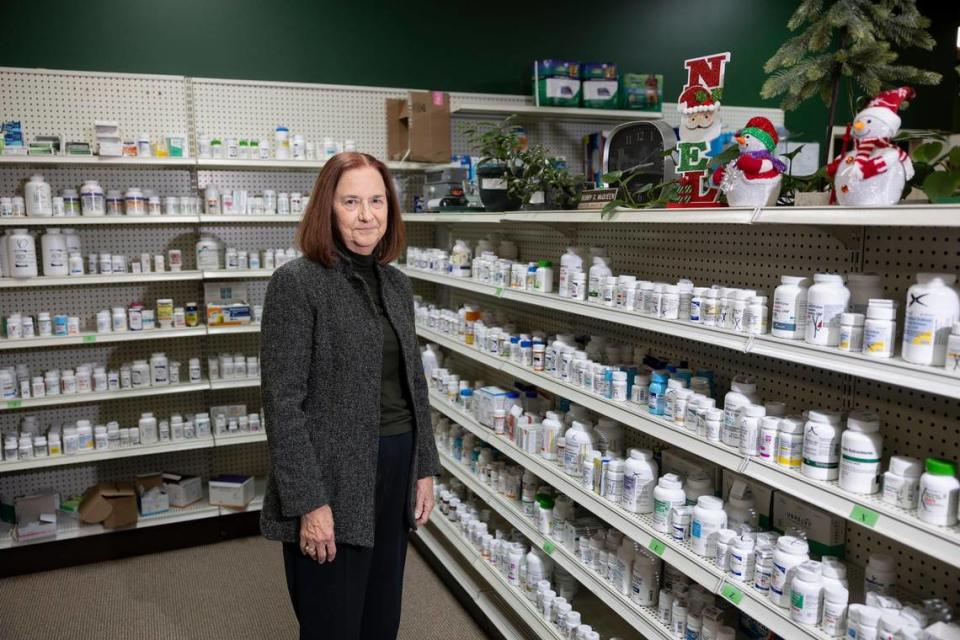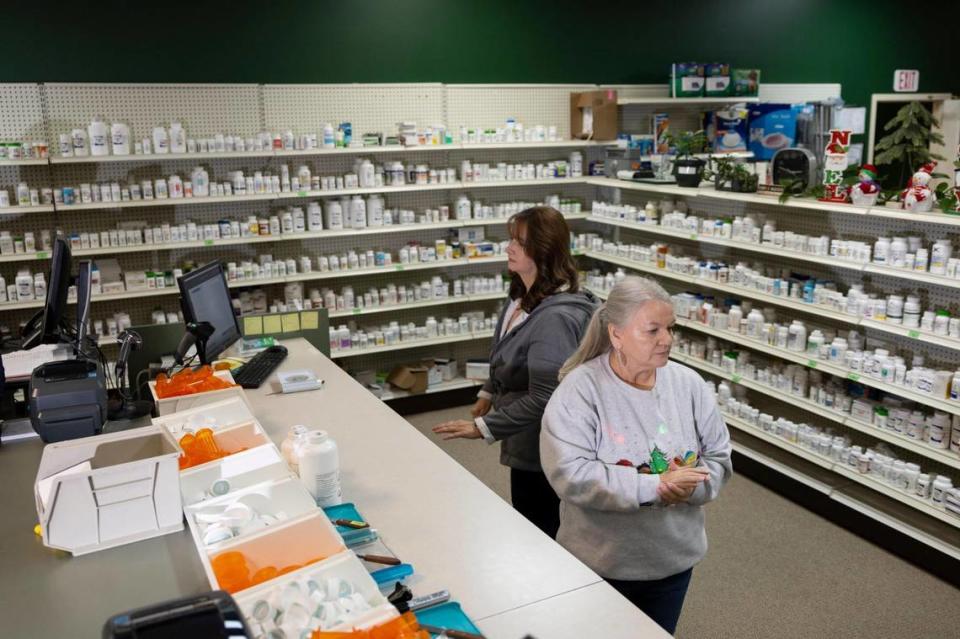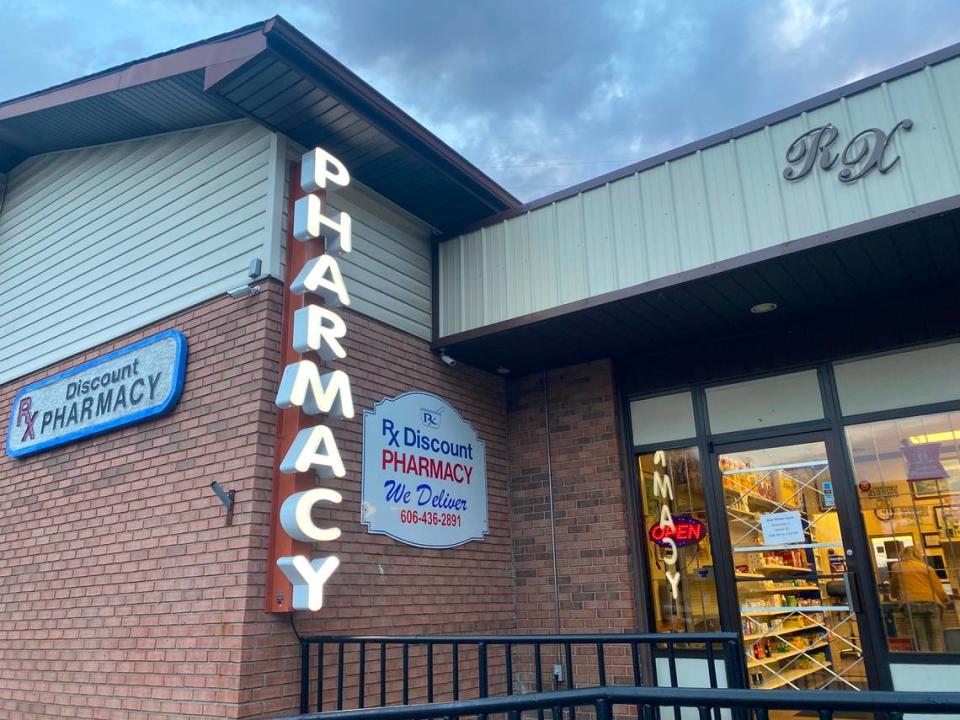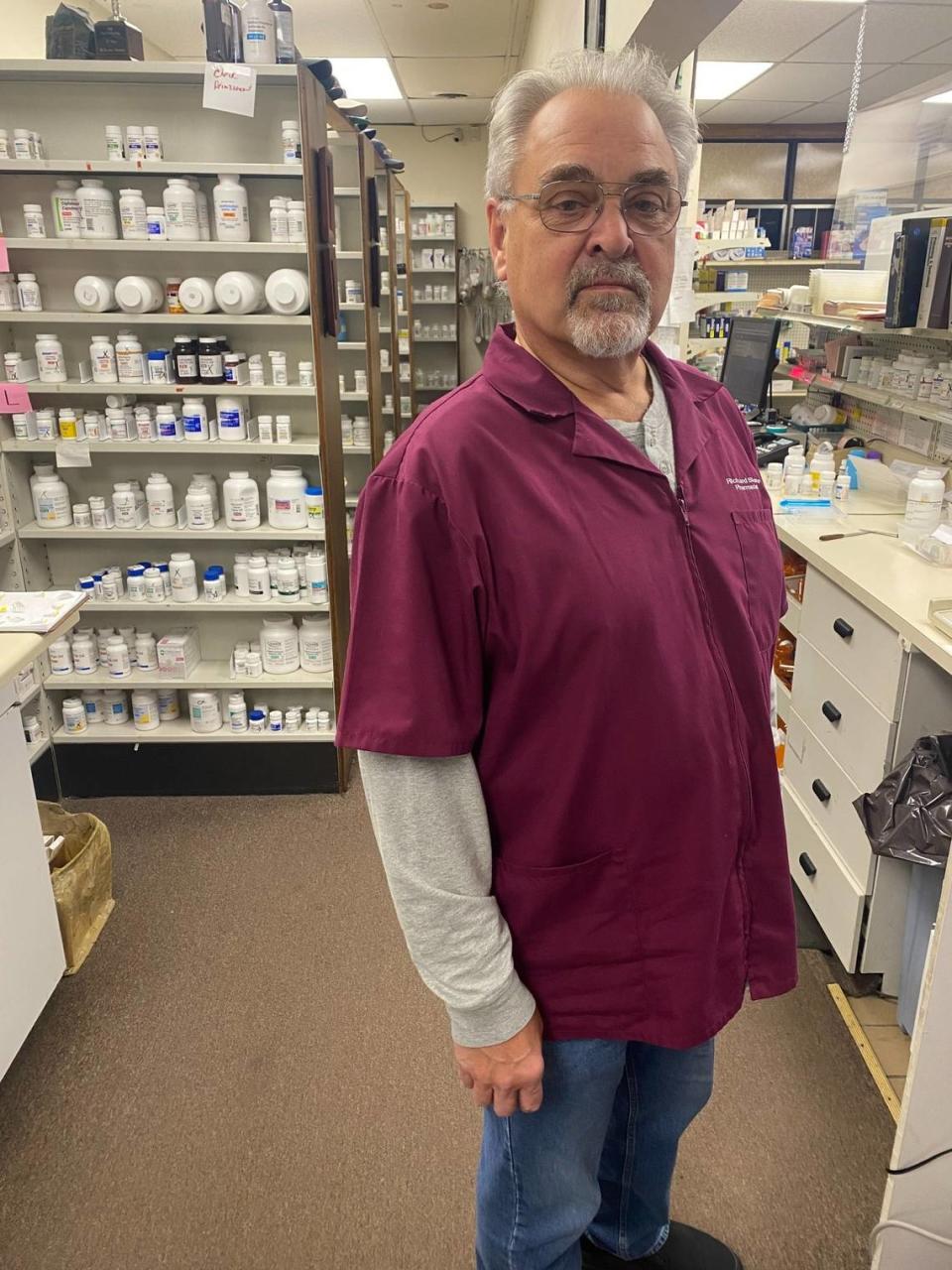‘Witnessing an industry collapse’: Why KY’s independent pharmacies are closing in droves
- Oops!Something went wrong.Please try again later.
When it became clear that the only way to keep their four Northern Kentucky independent pharmacies afloat was to siphon money from their personal retirement funds, Jennifer and Erik Grove made a painful decision.
It was finally time to call it quits.
It was 2021, and after years of tossing solicitation letters in the trash from CVS Pharmacy and Walgreens offering to buy them out, the Groves, who owned pharmacies in Warsaw, Carrollton, Campbellsburg and Bedford, begrudgingly agreed to call a corporate chain.
Like dozens of other independently-owned pharmacists across Kentucky, the Groves could not manage to consistently turn enough of a profit. It wasn’t that their stores, two of which were the only pharmacies in their counties, weren’t high-performing.
Each time an independent pharmacist fills a patient’s prescription, how that pharmacy is reimbursed by insurance companies — and what amount in fees are levied for filling it — is decided by a somewhat arbitrary and complex tangle of decisions by entities outside a hometown pharmacy’s control.
This lack of control and contractual obligation to pay every fee levied has paved the way for independents to be financially gouged from multiple angles: Low or break-even reimbursement rates set by insurance companies often blunts a pharmacy’s ability to make a profit on every prescription they fill.
This reality is made harder to bear when factoring in the fees collected by Pharmacy Benefit Managers (PBMs), who act as a middle man between providers like Grove and insurance and drug wholesalers, and Direct and Indirect Remuneration (DIR) fees.
DIR fees are collected by PBMs and governed by the Centers for Medicare and Medicaid Services. Until Jan. 1, those fees were retroactively clawed back as many as six months after a prescription was filled.
Withstanding the mandate to fork over hundreds of thousands of dollars in fees, alone, borders on financially unsustainable for many independent pharmacies.
That financial burden, coupled with the unpredictable timeline by which that money is collected, is what eventually drowned the Grove’s businesses, Jennifer said.
Their final year of operation, the total sum of DIR fees, alone, surpassed $250,000, she said. Had they stayed open through 2022, Grove and her husband estimated those fees would’ve exceeded a half-million dollars.
“When we really looked at the future,” Grove said, “we just didn’t see one.”
They opted to sell all four Northern Kentucky stores and one in southern Indiana – the oldest continually operating pharmacy in the state, open since the 1860s – to Walgreens. The national pharmacy chain kept the Grove’s records and inventory but promptly closed all five locations.
Stories like this are a dime a dozen across Kentucky, according to seven independent pharmacists who spoke with the Herald-Leader and dozens more who’ve shared stories through the Kentucky Independent Pharmacists Alliance, or KIPA.
In the past year, at least 67 independent pharmacies have shuttered across the commonwealth – nine in Pulaski County, alone – driven to the brink by a combination of the factors that forced the Groves to close, according to pharmacy alliance co-founder Rosemary Smith.
“No one can withstand this onslaught,” said Smith, who owns six pharmacies across Eastern Kentucky with her husband, Luther.

During the month of August, the Smiths, who’ve owned and operated independent pharmacies in Kentucky for over 50 years, saw more than $200,000 collected in DIR fees from prescriptions filled within the past six months.
In the past two years, the amount collected in DIR fees from their stores have increased by nearly 101%, from roughly $807,000 in 2021 to nearly $1.6 million in 2023.
For all 615 independent pharmacies across Kentucky, Smith estimates more than $203 million will be cleaved in DIR fees in 2024.
“This increase in DIR fees has resulted in many independent pharmacies being left with little to no capital funds to survive 2024,” Dr. Michael Berry and Elizabeth Berry wrote in a Dec. 31 email to Chiquita Brooks-LaSure, adminstrator of the Centers for Medicare and Medicaid Services, which was provided to the Herald-Leader.
The pair own Mason Family Drug in Maysville.
Federal regulations have historically dictated these fees be collected retroactively, up to six months after a prescription is filled. But that changed Jan. 1, when DIR fees began to be collected at the point of sale.
Pharmacists told the Herald-Leader they expect this temporary overlap, where DIR fees from as far back as June 2023 continue to be retroactively deducted as new fees are levied on prescriptions filled currently, will inevitably force more closures.
“Most independent pharmacies have been on life support for the last several years,” the Berrys wrote in their letter. “We are witnessing the initial stages of an industry in collapse.”
‘They’re trying to put us out of business’
While the financial impact is felt most acutely by the pharmacy owners themselves, the impacts are broad, as pharmacists are often the first – and most accessible – health care provider point of contact in their communities, particularly in rural parts of Kentucky.
Dozens of independent Kentucky pharmacists in recent months have penned letters to federal officials, as well as state representatives, begging for help.
“If (Centers for Medicare and Medicaid Services) does not intervene, patients who depend on independent pharmacies across the country in rural and underserved areas will lose access to care,” Smith wrote in a Dec. 15 email to Brooks-LaSure.
“We are in an unsustainable financial situation,” Ron Poole told a handful of state lawmakers in a Nov. 30 email provided to the Herald-Leader.
Poole, who has worked as a pharmacist for 33 years, operates six locations across western Kentucky.
New regulations mandating DIR fees be collected at the point of sale, on top of leftover DIR fee collections from 2023, “will not only cripple our existing cash flow crisis,” Poole explained, “but put us in a situation where we have no choice but to go out of business.”
It’s demoralizing, he said.
“As a pharmacy owner, I have to mentally compartmentalize my business considerations from my role as a pharmacist in order to keep my sanity. Because thinking about and working on your pharmacy business in this day in time is such a paralyzing thought, that I have to put it out of my mind in order to keep moving forward with pharmacy and pharmacists advancement plans.”
It would be different, Poole said, if he hadn’t been working for over two decades to call attention to these industry pitfalls.
“I truly start out each day having to get over my failure as a de facto lobbyist and wondering when or if my 33-year-old business will fail.”

Many have already come face to face with that reality.
When Craig Seither was forced in July to close his Fort Thomas pharmacy — the last remaining independent in town, open for more than 75 years — he taped a series of notes to his building windows, including a line-item list of recent DIR fees, explaining why.
“I am sorry to all the patients, families, pet owners and loved ones that put their faith in (us),” Seither wrote.
“I feel like I am letting you down. Unfortunately the continued economic pressures being placed on retail pharmacies by PBMs are getting worse.”
Under this note, Seither taped a print-out sheet of paper displaying total DIR fees paid during the month of June last year — more than $7,000.
Though it’s not a problem unique to Kentucky, its impact is nonetheless acute, which is why the Kentucky Independent Pharmacists Alliance is asking Kentucky lawmakers to intervene.
Sen. Max Wise, R-Campbellsville, said he will likely introduce that bill, which will probably look similar to the “commercial pharmacy PBM reform” bills passed in recent years in Tennessee and West Virginia.
Tennessee’s 2022 law, backed by the Tennessee Pharmacists Association, gives independent pharmacies greater control over the PBM contracts they agree to, including by mandating those groups reimburse no less than the actual cost for a prescription drug.
That is an aspect not currently mandated by law in Kentucky.
“It’s not a level playing field,” Smith said. “If we’re being paid by the people who are our competitors, it’s never fair. We’re valuable, but it’s just anti-competitive. They’re trying to put us out of business.”
‘It’s hard to quit’
Independent pharmacies in Kentucky filled more than half of all prescriptions statewide and before 2023’s closures, independents operated in all but one of the state’s 120 counties, according to Smith.
In her office at their pharmacy in Beattyville – its original location, a historic building along the North Fork of the Kentucky River, flooded in 2021 – Smith has a map of Kentucky propped on a display easel. It’s peppered with dots marking each of the independent pharmacy closures over the past year.
For each of the independent pharmacists that have shuttered, there are just as many, if not more, who’ve dipped into their own savings and retirement funds to keep their businesses open.
Perched atop a hill in Hazard, it was nearing dusk at Richard Slone’s RX Discount Pharmacy, and a line of cars idled in the drive-thru lane.

Slone owns three pharmacies: One in McKee, Manchester and one in Hazard, which he opened in 1995 and where he still works behind the counter. In a given year, he’ll do $10 million to $12 million in sales.
After the COVID-19 pandemic normalized fewer person-to-person interactions, the number of patients walking through his front door to mill in his pharmacy aisles while they waited for prescriptions to be filled dropped off. Now, most idle in their cars in the drive-thru, curbing Slone’s need to keep his store shelves stocked.
This, coupled with the combination of fees, break-even reimbursements, and clawbacks, Slone said he’s “barely scraping by.”
On a Tuesday in early December, still wearing his pharmacy coat from filling prescriptions behind the counter, Slone pointed to a line-item list on a piece of paper in his office that shows cumulative DIR fees collected in 2023. Below him, on the first floor, a team of four longtime employees worked quickly filling prescriptions.

DIR fees aren’t just difficult to absorb because of the sheer amount of money that’s being clawed back – in 2023, he paid more than $600,000 in them – but the manner in which those sums are deducted is somewhat unpredictable, Slone explained.
“Today, they took back almost $18,000,” he said, sighing.
“In my store in Hazard, they took back $4,700, and from my store in Manchester they took back $13,000. And that’s just from prescriptions I filled between June 1 and June 15.”
Though his pharmacies are still operational, it’s largely because he made the choice the Groves wouldn’t: To dip into his own retirement and savings.
“I wake up in the middle of the night, worried how I’m going to pay my people,” he said.
“It’s hard to quit; these are all my neighbors. One lives in my same holler. You work so hard, you want to keep your employees and you’ve served your patients for years.”
Most of his employees have been with him for more than two decades — one hits her 30-year employment anniversary this year — like many of his patients. In the interest of both, Slone estimates he’s borrowed roughly $300,000 from his life insurance, and another $600,000 from his retirement, just to keep his business going.
“I borrowed money that I probably shouldn’t have,” Slone said.
“My goal is just to stay here until tomorrow.”

